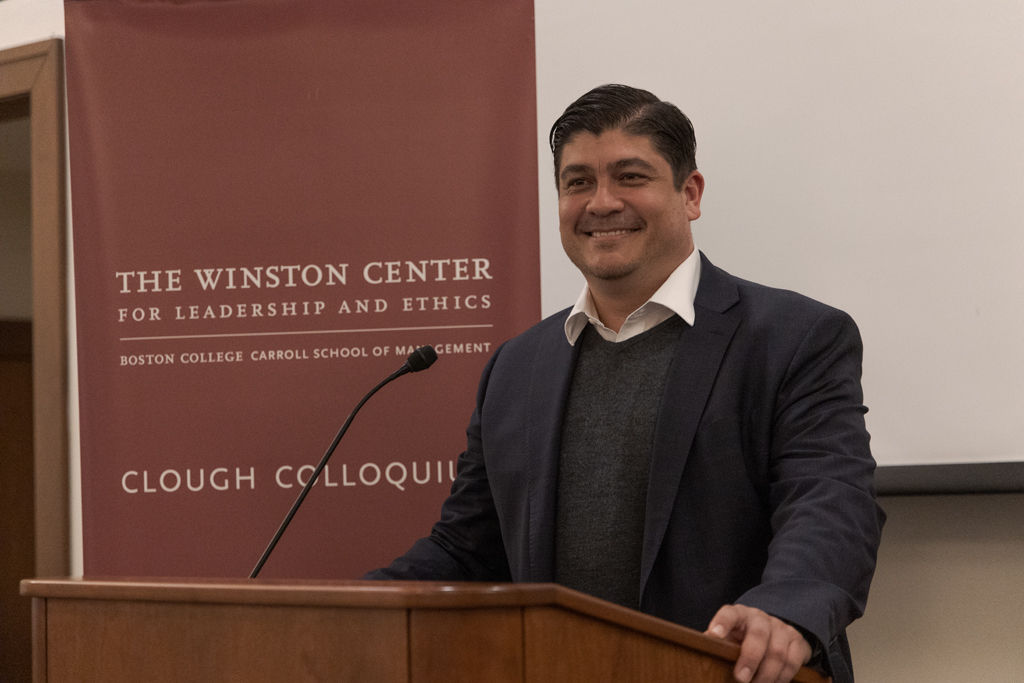Leadership for Service, Not Power
Being a leader is about enacting change, not retaining power, according to Carlos Alvarado Quesada, the former president of Costa Rica. “When we tend to think about politics, there’s such an emphasis on politicians trying to preserve power,” Alvarado Quesada said. “But power, from my view, only serves a purpose if it’s into the service of something—into changing things.”
Alvarado Quesada was elected president of Costa Rica in 2018 and finished his constitutionally limited term in 2022. According to him, he had always been an introvert, never anticipating he would pursue a career as a public leader. “I always pictured myself as someone being there to help but not in the front,” he said.
After receiving journalism and political science degrees in Costa Rica, Alvarado Quesada received a scholarship to study in the United Kingdom, where he encountered new people and ideas that compelled him to make a difference in the world. “I was in that mindset, then I thought to myself, I want to go back to Costa Rica—where I was politically involved—to support and to make change happen,” he said.
Alvarado Quesada returned to Costa Rica to help direct communications for a presidential campaign. When the candidate he was working for lost, he found himself searching for a job again. Though he never anticipated entering the private sector, Alvarado Quesada said that he ultimately found a job at Procter & Gamble, the multinational umbrella company of various consumer brands.
“I remember my first day, they told me you’re going to work with Febreze, and I said, ‘What is Febreze?’” he said, drawing laughs from the audience. “I ended up launching Febreze in Latin America as a brand manager.”
While Alvarado Quesada said he greatly respected the private sector, he decided he needed to do something more fulfilling. When his former professor and then-presidential candidate Luis Guillermo Solís asked him to be the communications director for his campaign, Alvarado Quesada said yes—on the condition that he would have full responsibility for the role.
“The previous campaign I was there supporting from the back,” he said. “The problem is that when you are trying to help but not holding responsibility, you’re not holding the helm.” When Solís became president of Costa Rica in 2014, Alvarado Quesada became the minister of human development and social inclusion, a role he said he appreciated because it allowed him to tackle issues of housing, climate change, and education to help vulnerable populations.
But as 2016 rolled around, Alvarado Quesada said he noticed a lack of sound candidates gearing up to run for president after Solís finished his term. He said that as the country neared fiscal default, he grew concerned it would fall to populism.
“Real freedom, real liberty is responsibility,” Alvarado Quesada said. “It’s taking a hold of your capacity to do things, to act.” He thus decided to run for president, and he won, stepping into office in 2018.
But winning was “the easy part,” according to Alvarado Quesada. “The big chunk of my initial political capital of the world election was put into doing something particularly unpopular, which was enforcing fiscal reform,” he said. Alvarado Quesada explained that this fiscal reform focused on tax increases for the wealthy, a particularly polarizing move. Nevertheless, he said, this decision helped Costa Rica avoid an impending financial disaster. “Looking back, we averted a huge crisis,” he said. “No one is going to thank you for something that did not happen. So why do it? One has to do it because it’s the right thing.”
While in office, Alvarado Quesada said that he began thinking about the work his parents’ and grandparents’ generations had done to improve Costa Rica. “The question was, ‘What was going to be my legacy for the future?’” he said. With his legacy on his mind, he introduced a plan for decarbonization in Costa Rica. “It was a comprehensive plan … that crossed all the sectors of government and industry, agriculture, transportation, energy—everything,” he said.
Alvarado Quesada said that while skeptics were concerned this plan would negatively affect the economy, an independent study by the RAND Foundation proved the opposite. “It demonstrated that it was not only good for the environment, but it was good for business, and it was good for the country,” he said.
In 2019, Costa Rica collaborated with France and the United Kingdom to create the High Ambition Coalition for Nature and People, a partnership with countries worldwide that aims to conserve and manage 30 percent of the earth’s land and oceans by 2030. The project grew to include over 100 countries shortly after its founding. “I always say that if somebody tells you there’s something possible, take it as a gift,” Alvarado Quesada said. “Take it as something to fuel your positive ambitions for change to happen.”
Alvarado Quesada finished his presidency in May of 2022. Costa Rica’s constitution requires an eight-year waiting period before running for presidential re-election, making him eligible again in 2030. Currently, Alvarado Quesada serves as a professor at Tufts University’s Fletcher School of Law and Diplomacy. He said he values sharing his experiences to show young people how to fulfill their purpose.
“The best pay you can get as a human being, way beyond that wealth, or money, or recognition, is the possibility of being of service to others,” he said.
Adapted from The Heights article by Will Martino '26 and Madison Hoang '27




